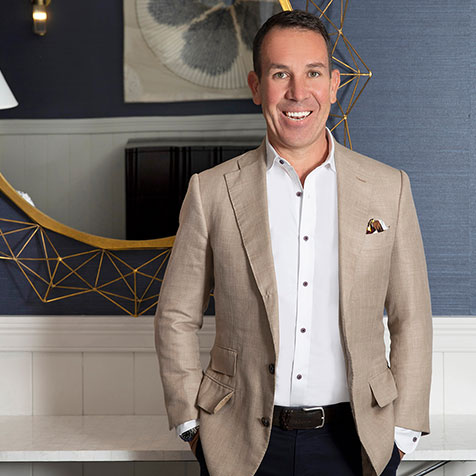Loading component...
At a glance
By Johanna Leggatt
It was late 2007, and Piers van Hamburg was feeling stressed out and exhausted, and wondering if he had made a huge mistake.
The Sydney real estate agent had just purchased an agency in the lower north shore of Sydney that was bleeding money, his wife had just had a baby and, perhaps unsurprisingly, he was not sleeping.

“The office that my business partner and I purchased was losing money, about A$30,000 a month, but we thought it had huge potential,” van Hamburg says.
Then the global financial crisis (GFC) hit, and van Hamburg’s plans to revitalise the business were seemingly quashed overnight.
“It was an incredibly stressful period, and there were many times when I honestly thought I had made a mistake,” he says.
However, crucially, van Hamburg did not give up. Instead, he expanded the business, reasoning that the GFC would enable committed agents to prove their worth. After all, it’s easy to do well in a strong market, but surely, he reasoned, a sluggish economy would separate those who were merely riding on the coat-tails of a previous boom from the more committed professionals?
He was right. “We took our business from one office to three offices, and then from 10 staff to about 80 staff,” he says. “Our 2.5 per cent market share grew to about 30 per cent market share between 2008 and 2012.”
Now, of course, there is a new obstacle in the shape of the uncertainty caused by the COVID-19 pandemic and its flow-on economic effects. While van Hamburg worries on occasion, he is cautiously optimistic about the future.
“Having navigated and grown a business through tough times, I know we can do it again,” he says.
Slowing down
Unprecedented times, we are told, are upon us, with the very real prospect that Australia, and many countries across the world, will fall into a long economic slump. An early International Monetary Fund (IMF) forecast that the “great lockdown” will reduce global GDP by 3 per cent this year is looking optimistic.
Professor Mahendhiran Nair FCPA, CEO of Monash Malaysia R&D and professor in the department of econometrics and business statistics at Monash University, thinks a lengthy global recession is “possible”.
“Hopefully we can avoid a depression, as although many countries have won the battle, until there is a vaccine, they cannot be confident they have won the war,” he notes.
Of course, this is not the first global financial fall-out we have experienced in modern times, but it is different to the GFC in many respects.
According to the Australian economist Tim Harcourt, who is the J.W. Nevile Fellow in economics at the University of New South Wales Business School, it is hard to compare the two shocks.
“The GFC only hit a few economies – it was more the North Atlantic financial crisis – whereas the ‘Corona crisis’ is hitting every major economy in the world, all at once,” Harcourt says.
“You had the GFC in 2008 and the Asian financial crisis in 1997, and if you put them both together and then drag in the rest of the world, you have the Corona crisis.”
Furthermore, as Harcourt notes, the pandemic is primarily a health scare that has affected global supply chains, but the GFC was a negative “demand shock” triggered by the sub-prime mortgage collapses in the US.
“In the case of this pandemic, the supply chain has been totally disrupted,” he says.
“Then, because these disruptions occurred, and economies were shut down in response, a demand shock later followed.”
Most notably, there was no dodgy banking or bad loans that caused the most recent crisis. Instead, quite remarkably, an economic downturn has been deliberately triggered to avoid the even worse fate of deaths on a mass scale.
“In contrast, the GFC and past recessions were born out of mistakes,” Harcourt notes.
This is not to suggest there is no relationship between what we are experiencing now and previous global upsets.
As Harcourt notes, the Australian Government’s economic stimulus response to the GFC was summed up in the maxim “Go hard. Go early. Go households,” while the current government’s response to the pandemic has been defined as “Go big. Act fast. Keep the lights on”.
Harcourt agrees that the GFC crisis, in some respects, prepared the nation for the current upheavals.
“Australia’s policy response to the pandemic has been swift and well coordinated, and it wouldn’t be wrong to thank the GFC in some ways for this front foot,” he says.
Australia’s institutions are also well equipped. In the wake of the GFC, the Australian Government embarked on expansionary fiscal policy and provided guarantees on deposits and bonds issued by banks. The Australian Prudential Regulation Authority and the Australian Securities and Investments Commission also strengthened lending standards to “make the financial and private sectors more resilient”, as pointed out by the Reserve Bank of Australia.
These measures, Harcourt says, have allowed the Australian Government “to act quickly nowadays”.
Similarly, according to Nair, many Asian countries went through a steep learning curve as a result of the Asian financial crisis.
“During the late 1980s and early 1990s, a lot of money was flowing into developing Asian countries,” Nair says.
“Unfortunately, there was no proper risk management.”
The ensuing financial crisis hobbled a number of Asian nations, which prompted the intervention of the IMF.
Nair contends that Asian countries that emerged from the Asian financial crisis were in a better position from that point on, because of a series of “shock absorbers” that were put in place.
“After the crisis, many Asian nations strengthened their financial system, and instituted stronger financial regulation, such as capital controls in Malaysia,” Nair notes.
The 2003 SARS outbreak had less of an impact than the current pandemic, claiming fewer lives and failing to spread as far or wide.
“It did not bring the entire global supply chain to a screeching halt,” Nair says, “but, of course, we are much more connected globally these days.”
CPA Library resource:
It can be done
Melbourne-based businessman Alec Jeffery knows first-hand the impact that a large-scale economic shock can have on a burgeoning business.
Jeffery began his IT consultancy and software company Tridant in 2007, not long before the global markets began their shaky descent.
The company started as a two-man operation with a co-founder and a singleproduct company, and Jeffery admits to having “no clue” about what he was doing.
“We were naïve, because we did not start our business with a single connection or opportunity in the pipeline,” Jeffery says.
“It took about six months to get our first deal, and then the GFC hit the next year.”
However, Tridant didn’t just survive the GFC – it thrived. Nowadays, Jeffery employs more than 75 people across the Asia-Pacific region, including Australia and Singapore.
He concedes the GFC forced a reckoning of sorts, and a stronger, leaner business emerged as a result.
“It made us really look inside the business and ask, ‘What is our value add?’,” he says.
“We then positioned our business not as a technology consultancy, but as a business consultancy that uses technology to great effect.”
Tridant’s business offering to clients is built on three pillars, grouped broadly into software sales, managed services, and consultancy and bespoke tech solutions.
“We didn’t build our business deliberately to have a diverse portfolio of services so we could be resilient, but now we can see that is what we have actually done,” he says.
The software sales have softened owing to the pandemic, but “some clients are seeing the value in [conducting] modelling on their business right now, so that side has increased”.
New opportunities
Opportunity can emerge even in the worst financial downturns, Jeffery notes, and he and his team are already looking forward.
“We are thinking about what our business environment will look like after the pandemic, as it won’t be ‘business as usual’,” Jeffery says.
“We are asking how we can take a more meaningful role in the new market.”
It also helps that this is not Jeffery’s first economic downturn.
“Once you get through one crisis, the second one doesn’t feel as bad,” he says. “This will end at some stage, but right now this is the test. We are being tested.”
Van Hamburg advises businesses to focus on their market share.
“It’s much easier to grow market share in a tough market compared to a market where everything sells easily. We focused on selling the homes that the other agents couldn’t,” he says.
In 2008, van Hamburg’s team outlined in a vision statement their goal to be the market leader in Sydney’s lower north shore by 2012 – which the team realised by 2011.
“In hindsight, creating a vision and creating a clear roadmap to work towards gave us great direction and resilience through tough times,” he says.
Finally, very little can match the power of sheer hard graft.
“During the GFC we outworked the competition,” van Hamburg says. “I was working 12-hour days, six days a week. I had to.”
How businesses can survive a global shock:
- Reduce expenses
- Consider growing your market, especially if your competitors are suddenly exposed
- Be prepared to work harder than ever
- Create a clear roadmap of what you are trying to achieve
- Lead through a positive attitude: if you come into the office negative, it will impact staff

